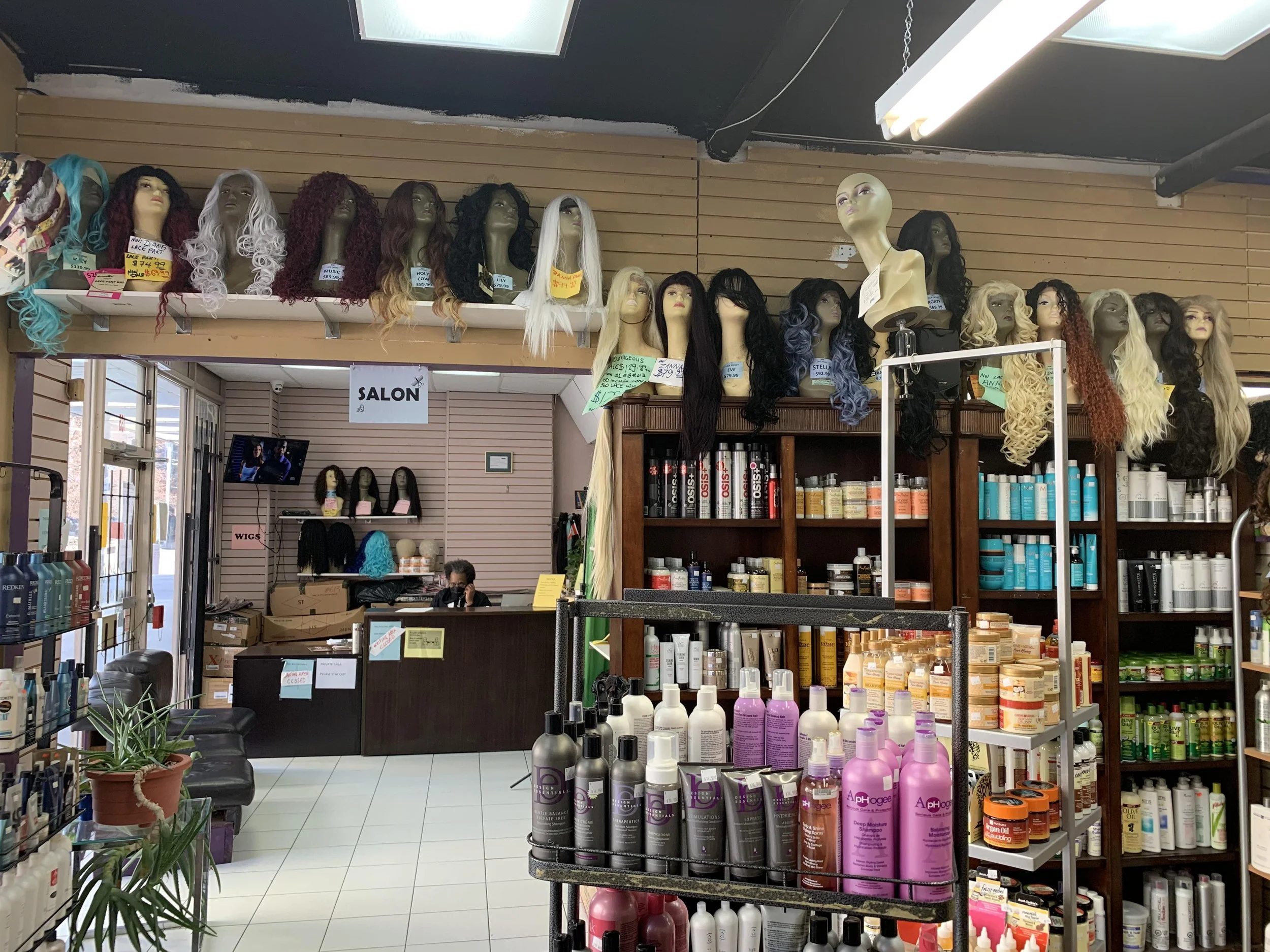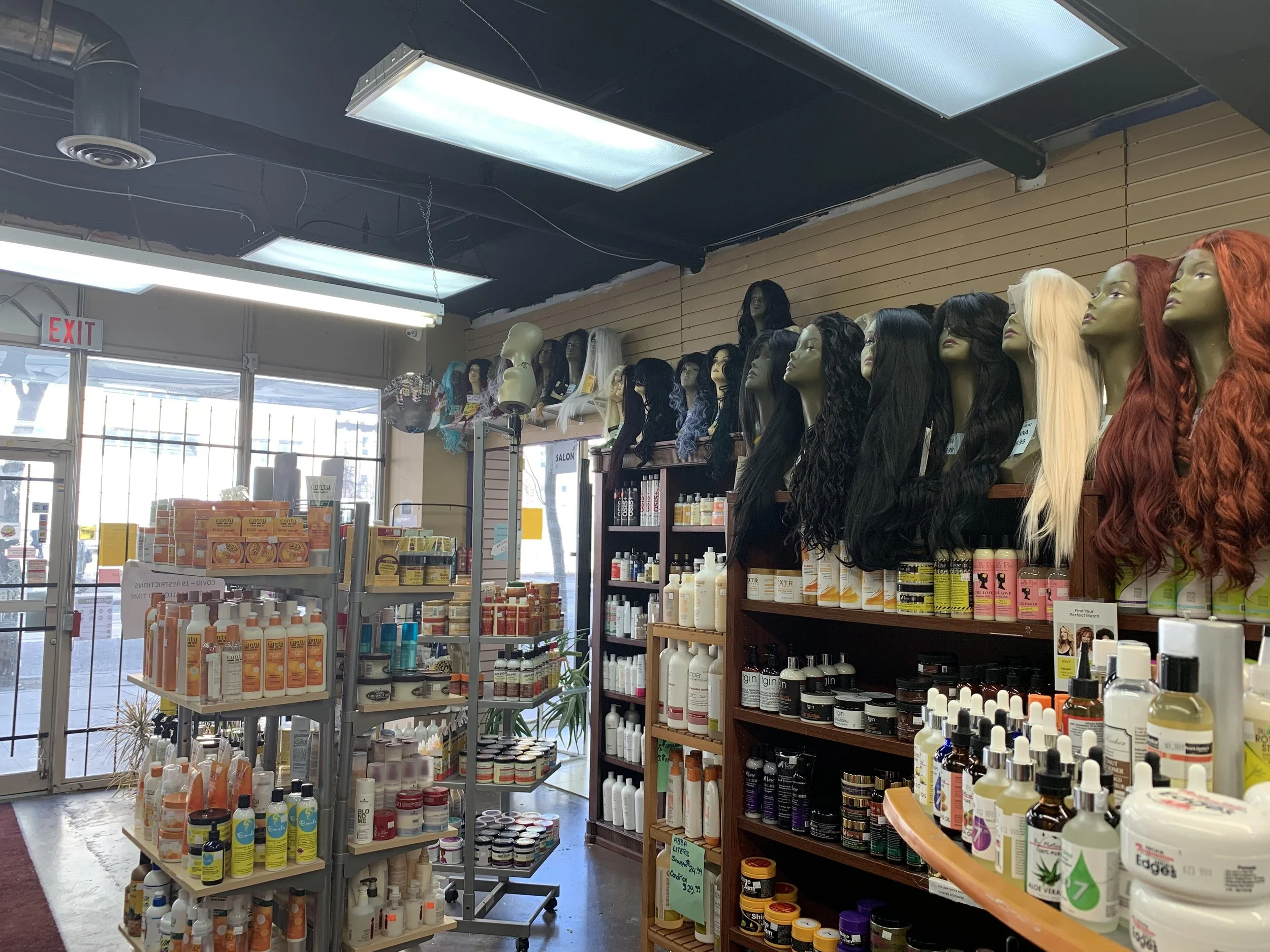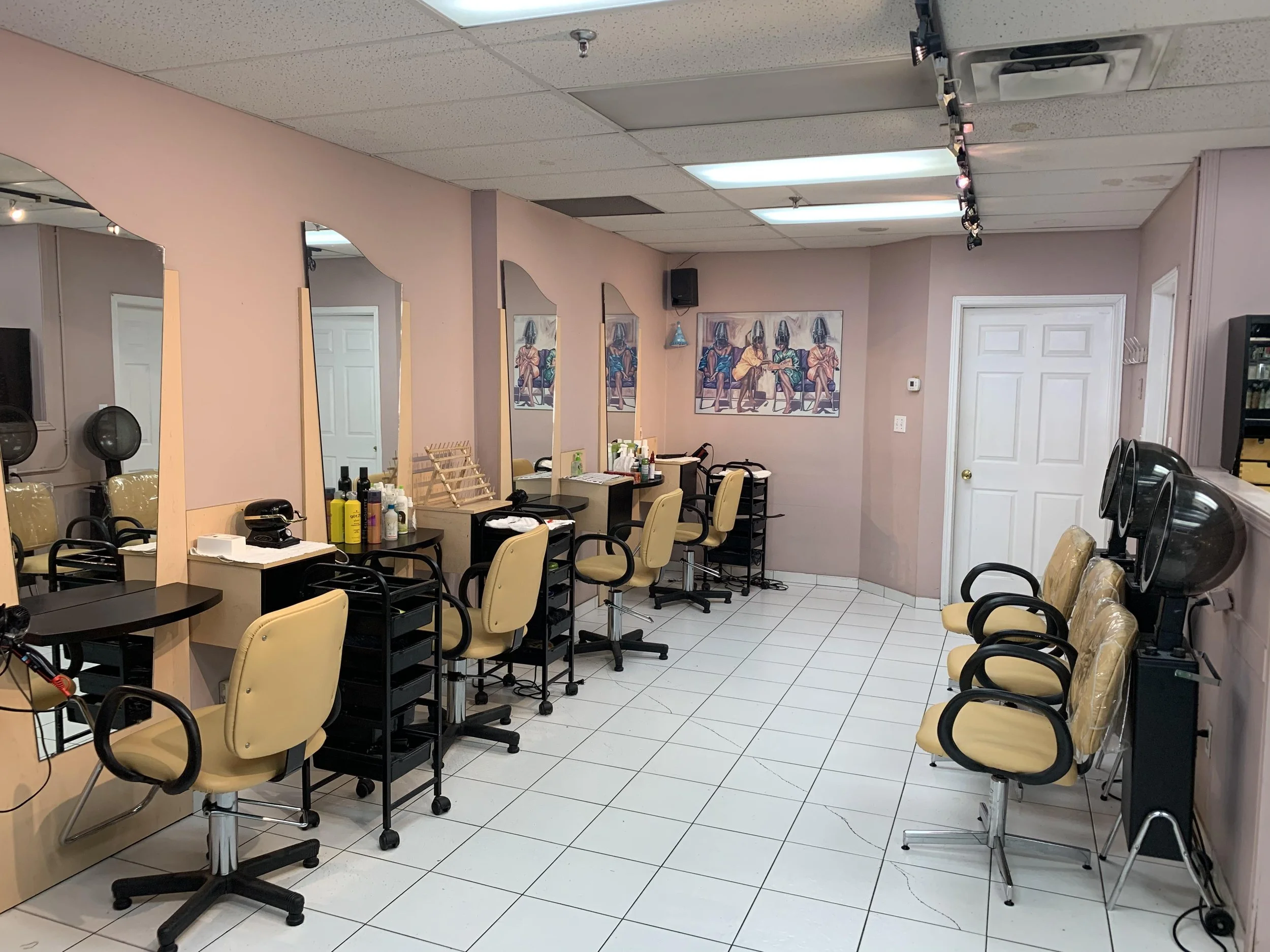Rare Tales, Challenges Overcome: Conquering Toronto in Pride
“We never tried to hide our identity or our sexuality… If you live your life openly and transparently, you will survive.”
Audible as a foghorn, echoes of breathy but vigilant Caribbean feminine voices emitted whenever the strident negativity confronting Gordon Oliver while surviving downtown Toronto as an openly gay Black man in the early nineties nearly swayed him.
Oliver remembered his elders teased him as a child about growing up to become a manager because of his classic physique.
“My grandmother and the old women in the village told me I was going to be somebody,” Oliver said. “I never let anyone deter me from my objectives.”
Oliver added that he grew up poor in Barbados and knew that once he got to Canada, he was “going to be somebody.”
The entrance to Ragga Hair Studio & Beauty Supply Store, 135 Dundas St. E., on Friday, March 19, 2021. Ragga Hair Studio & Beauty Supply Store opened in the heart of Toronto in 1997. (DeAndra Asapokhai/ Ryerson School of Journalism)
Oliver met his Grenadian-born spouse Ricky McSween in Canada before starting their business.
McSween wondered why Oliver wanted to go into hairdressing because he was already in the financial services sector and doing good for himself.
After immigrating to Canada, Oliver studied economics and law at a college in Ontario.
Then, he began selling insurance and employee benefits after he graduated.
An Immigrant’s Obstacle Vanquished
On Friday, March 19, 2021, the director at Ragga Hair Studio & Beauty Supply Store, Gordon Oliver, poses behind the store counter. (DeAndra Asapokhai/ Ryerson School of Journalism)
During Oliver’s time in finance, a contract translated to a five-year role as a key-accounts-manager consultant with Revlon at Toronto Eaton Centre.
He developed a department for the company to manage, market and sell to the ethnic community, resulting in starting his own business.
“They didn’t have a clue what was going on in the ethnic trade here in Canada, so they weren’t really looking for anybody,” Oliver recounted. “But being an economist, I was very ambitious, so I got their contact, and finally, I asked them if they were looking to hire anybody.”
It took Oliver about six months of constantly maintaining contact with someone at the company to receive a job offer.
For many immigrants, the struggles of settling to work are now second nature to the immigration experience.
According to a study in the American Economic Journal, employers value Canadian expertise far more than Canadian education when interviewing applicants with foreign backgrounds.
Ragga Hair Studio & Beauty Supply Store
Just under 25 years ago, Oliver and McSween used around $7,000 of their retirement portfolio, borrowed merchandise, and a $50,000 federal government small-business loan to generate their business.
The Canada Small Business Financing Act was established in 1998 to increase the availability of financing for the establishment, expansion, modernization and improvement of small businesses in the country.
Oliver started his business after his long-time friend and former colleague, Mr. Cohen, realized he wasn’t getting paid enough for his skill while working for people.
Cohen offered Oliver about $8,000 worth of merchandise he allowed him to pay back after selling.
“He said I’m not gonna ask you ’cause I know you’re Black and they’re not paying you enough money but when you have those types of skills you shouldn’t work for others, you should work for yourself.”
Notwithstanding the sweltering heat, draped in all black and fixed behind the store’s counter, “Welcome to Ragga!” McSween exclaimed with a smile.
At the beeping sound of the front door, Oliver strolled across the room in a museum of hairstyling materials while he sorted inventory and remembered Cohen.
“He was one of my accounts when I worked for a manufacturer, and he saw how my work was impacting the market,” Oliver said.
Ricky McSween and Gordon Oliver, owners of Ragga Hair Studio & Beauty Supply Store, are in their work uniforms. The couple posed for a photograph inside their store on Friday, March 19, 2021. (DeAndra Asapokhai/ Ryerson School of Journalism)
“We dress this way to remain uniform,” Oliver added as he dispensed sanitizer in his hands.
Through the Lens
Hit with nostalgia; the store had every colour and type of braiding hair one could imagine.
Surviving Dundas
McSween sat behind a table in the next room, with the entrance reading “SALON.”
“He does excellent work with hair, and customers worship his work,” Oliver said regarding his spouse.
Moreover, McSween, who grew up on the streets of Grenada, approached working in the neighbourhood by being polite, helpful and generous.
“I’m a friendly guy, and people notice that,” McSween said.
And though they got a great deal on rent from when they first moved in, Dundas Street East was considered one of the worst operational areas.
“There were a few bars across the street where people got drunk all day, and prostitutes would come out and strip wallets out of old men’s pockets,” Oliver recalled as he giggled.
So to avoid being victims of criminal activity, they learned to work with the people on the streets by giving them food or getting their hair done, and McSween’s background made this easier.
Heeding Cohen’s advice, Oliver and McSween grew their business by reinvesting their initial profit from hairdressing into their product sales.
“I generally feel very welcome, and it’s always easy to find what I need regarding customer service,” a customer at the store shared.
Gordon Oliver recounts the challenges he and his husband, Ricky McSween, faced as immigrants and openly gay Black men in a community managed by wealthy white people in the 90s.
A Day in the Life, and COVID-19
A day at the store entails performing various tasks like merchandising and displays, building orders and talking to supply sources.
“It’s difficult during the pandemic period to describe a typical day because nothing is typical,” Oliver said.
They’d have 30 to 50 retail clients and about 20 service clients a day before the COVID-19 pandemic.
During the pandemic, they have about 10 people a day coming through the store. They don’t have service staff due to regional lockdown restrictions.
At the reopening of personal care services across Ontario, 10 people will be allowed to participate in these activities and must follow public health recommendations, CBC reported.
A few years ago, they could maintain an administrative staff, focus on the overall management of the business and do some services themselves.
In the current environment, this has changed as they no longer have administrative staff due to modern technologies, and they’ve become self-sufficient.
Furthermore, the couple established a good relationship with people like their landlord, who provided them with sustenance opportunities.
They’ve also established reasonably supportive relationships with their suppliers.
Oliver and Mcsween now generate about half a million dollars in sales annually.
As an openly gay Black man and immigrant, Oliver believes everyone has a chance if they own who they are, humble themselves, and roll with the right crowd.
“The secret has been to align ourselves with people of means,” Oliver said. “My success was built on just going forward and not being afraid to grow… It’s the fear of failure that’s kept me going.”










